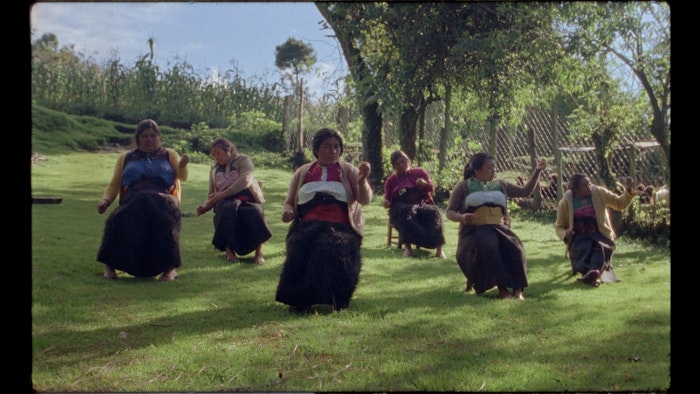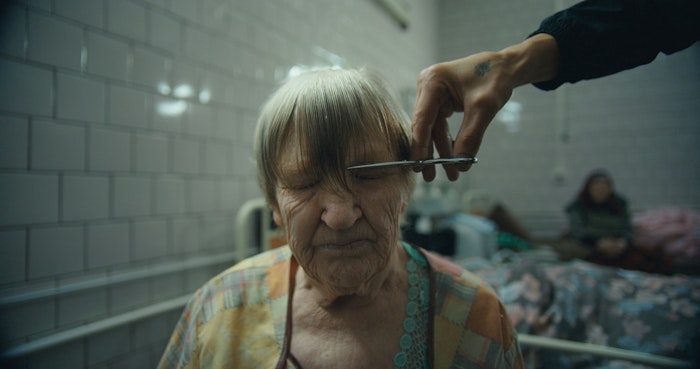Ways to Traverse a Territory
In Ways to Traverse a Territory, a Tsotsil family herds sheep in the misty mountains, preserving their cultural identity. The filmmaker’s personal connection to the land sparks a reflection on belonging, memory, and transformation. Blending archival imagery and intimate conversations, the film explores how landscapes shape identity and questions the artistry of filmmaking itself.
"a poignant exploration of how landscapes and identities intertwine. Through breathtaking visuals and personal narrative, the film examines the delicate balance between nature, memory, and belonging" - Doha Film Institute
Los Saldos / Remainders
José Ramón Capdevila lives in Binéfar, a village located in the province of Huesca, at the foot of the Pyrenees. He is a farmer, struggling (like many others in the same situation) with a drastic change in his social environment, since a large industrial abattoir was built in the region. His already complicated life is turned upside down upon learning that his filmmaker son Raúl, who had gone to work and live in the city, is to return home. The film follows a city-dweller’s reintegration into rural life as well as the dramatic condition of the countryside. Remainders, which opens in bright light, gradually plunges us into the darker world of what remains of farming culture today. The situation builds to a strong crescendo, exploring the most profound reasons behind this malaise, ending on a dazzling, dramatic final shot. - Visions du Reel
Hold on to Her
Mawda Shawri, two years old in 2018, sister of Hama, daughter of Phrast and Shamden, was shot dead by a Belgian police officer during a migration border control on a Belgian central highway.
In 2023, over 40 people, both undocumented and documented resident activists, assembled before the camera at La Voix des sans papiers in Brussels to stage a collective hearing of documents from and reactions to Mawda’s case.
In this collective hearing, the speakers acknowledge a ghostly haunting caused by police impunity and the state's lack of accountability. In their rejection of such a lack of truth and human rights, they feel the need to explore beyond the official narratives. Together they are producing the forensic counter-evidence to Mawda's deadly Channel crossing.
"a beautiful work of art and absolutely heartbreaking" - Letterboxd
Larry (They/Them)
Young non-binary trans photographer Laurence Philomène has emerged as one of the most original and inspiring voices of their generation and an LGBTQ+ community icon. Exploring the artist’s intimate world and creative process, LARRY (they/them) paints a luminous and engaging portrait of the complex, often misunderstood multiplicity of trans and non-binary identities and
experiences.
"For non-binary trans photographer Laurence Philomène, art, life and identity are intimately entwined. Though drawing from art history, their photographs strike a distinctive note with their pastel colours; capturing queer subjects, including Philomène themself, in restful poses, these portraits bloom in soft hues of pink, purple, blue – the full rainbow. This style seems to seep into Catherine Legault’s intimate documentary, which captures not only the artist’s creative process but also their daily life with vibrancy" - Guardian
*not available Canada
Dear Beautiful Beloved
"The war in Ukraine doesn’t stop at the front line. In addition to the lives of tens of thousands of soldiers, the Russian invasion has also claimed the lives of thousands of Ukrainian civilians. And many more have been driven out of their familiar surroundings. The war has destroyed homes, torn families apart and displaced populations.
In the midst of this wartime violence, a complex but highly effective relief network has emerged. Support for refugees and displaced persons is ongoing, as is the evacuation of older people living near the front, and the retrieval of the bodies of civilian and military victims.
Dear Beautiful Beloved is a careful and sensitive account of several humanitarian operations dependent entirely on the boundless dedication of volunteers. They receive refugees and guide them to train stations, help distressed seniors feel at home in bare reception shelters and drive through the country to pick up bodies, keep records and safeguard their belongings. Tirelessly they continue their work. There are moments of light even in these dark times, but they never last long." - IDFA






